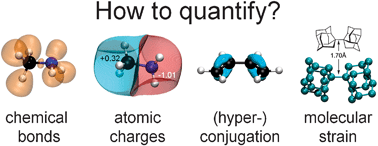Quantification of “fuzzy” chemical concepts: a computational perspective
Abstract
Chemists recurrently utilize “fuzzy” chemical concepts (e.g. atomic charges, the chemical bond, strain, aromaticity, branching, etc.), which lack unique quantitative assessments but, nonetheless, are frequently employed as tools for understanding the intricacies of chemical behaviour. This tutorial review provides an overview of the computational schemes specifically developed to quantify four of the most commonly employed, yet debated, chemical concepts: the chemical bond, atomic charges, (hyper)conjugation, and molecular strain. The enhanced knowledge gained from these schemes not only helps in the depiction of molecules with unique properties, but also provides breadth to our fundamental understanding of chemistry. Nevertheless, the numerous existing methodologies often result in different interpretations that culminate in discrepancies. Through recent examples in the literature, guidelines are provided which illustrate the strengths and weaknesses of various schemes for each individual concept.


 Please wait while we load your content...
Please wait while we load your content...